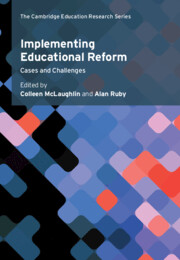Book contents
- Implementing Educational Reform
- Implementing Educational Reform
- Copyright page
- Contents
- Figures and Tables
- Contributors
- Preface
- 1 Why Focus on Implementation in Education Reform?
- 2 Promoting Equity in Education through System Change
- 3 A Decade of Reform in Hong Kong
- 4 Reforming a Whole School System
- 5 The Challenges and Opportunities of Greater Autonomy for Post-Soviet Universities
- 6 School Improvement by Design
- 7 Promising Practice in Government Schools in Vietnam
- 8 Reform Implementation Lessons
- 9 Qatar’s Road to Education Reform
- 10 Implementing Educational Reform
- Index
- References
2 - Promoting Equity in Education through System Change
Lessons from the United Kingdom
Published online by Cambridge University Press: 19 November 2021
- Implementing Educational Reform
- Implementing Educational Reform
- Copyright page
- Contents
- Figures and Tables
- Contributors
- Preface
- 1 Why Focus on Implementation in Education Reform?
- 2 Promoting Equity in Education through System Change
- 3 A Decade of Reform in Hong Kong
- 4 Reforming a Whole School System
- 5 The Challenges and Opportunities of Greater Autonomy for Post-Soviet Universities
- 6 School Improvement by Design
- 7 Promising Practice in Government Schools in Vietnam
- 8 Reform Implementation Lessons
- 9 Qatar’s Road to Education Reform
- 10 Implementing Educational Reform
- Index
- References
Summary
This chapter explores the issue of the development of systems of education and whether it is possible to develop education systems that are both excellent and equitable, since many reform programmes result in increased inequality. Mel Ainscow was centrally involved in the Challenge programme. The first, The London Challenge (1997–2010), raised pupil attainment and in an equitable manner. It was seen as highly successfull. This chapter explores the whole Challenge programme, including Manchester and Wales, and the cultural, political and social factors seen as contributing to success, as well as the limitations. Ainscow argues against an emerging model of ‘what works’ in the implementation of policy and change of educational systems. He concludes by saying that successful change requires the coming together of different perspectives and experiences in a process of social learning and knowledge creation within particular settings.
- Type
- Chapter
- Information
- Implementing Educational ReformCases and Challenges, pp. 17 - 40Publisher: Cambridge University PressPrint publication year: 2021



